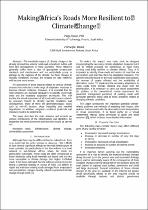JavaScript is disabled for your browser. Some features of this site may not work without it.
- ResearchSpace
- →
- Research Publications/Outputs
- →
- Conference Publications
- →
- View Item
| dc.contributor.author |
Paige-Green, P

|
|
| dc.contributor.author |
Verhaeghe, Benoit MJA

|
|
| dc.date.accessioned | 2019-01-25T08:05:36Z | |
| dc.date.available | 2019-01-25T08:05:36Z | |
| dc.date.issued | 2018-10 | |
| dc.identifier.citation | Paige-Green, P. and Verhaeghe, B.M.J. 2018. Making Africa’s roads more resilient to climate change. 2018 SARF/IRF/PIARC Regional Conference for Africa, 9-11 October 2018, Durban, South Africa | en_US |
| dc.identifier.uri | http://www.sarf-irf2018.co.za/papers/ | |
| dc.identifier.uri | http://www.sarf-irf2018.co.za/wp-content/uploads/2018/10/Paige-green-P.pdf | |
| dc.identifier.uri | http://hdl.handle.net/10204/10637 | |
| dc.description | Paper delivered during the 2018 SARF/IRF/PIARC Regional Conference for Africa, 9-11 October 2018, Durban, South Africa | en_US |
| dc.description.abstract | The inevitable impacts of climate change on the already stressed low volume rural road networks in Africa will have dire consequences in many countries. These networks generally suffer from a lack of appropriate construction standards and maintenance and are particularly prone to damage by the vagaries of the climate. As these changes in climatic conditions increase, the impacts on road networks will become more severe. An assessment of these impacts related to various climatic stressors has indicated a wide range of adaptation measures to improve climate resilience. However, it is essential that the road networks are assessed adequately to identify vulnerable areas and the necessary adaptation techniques. This will involve the visual assessment of all roads within each network by assessors trained to identify specific conditions and consequences. Many of these are geomorphological issues such as run-off, erosion, slope instability and material degradation. In addition, subgrade conditions (materials and moisture) need to be determined. The paper describes the main stressors and impacts on various components of the infrastructure and identifies the properties that need assessment and how this should be carried out. | en_US |
| dc.language.iso | en | en_US |
| dc.relation.ispartofseries | Worklist;21907 | |
| dc.subject | Roads | en_US |
| dc.subject | Infrastructure | en_US |
| dc.subject | Climate change | en_US |
| dc.subject | Vulnerability assessment | en_US |
| dc.title | Making Africa’s roads more resilient to climate change | en_US |
| dc.type | Conference Presentation | en_US |
| dc.identifier.apacitation | Paige-Green, P., & Verhaeghe, B. M. (2018). Making Africa’s roads more resilient to climate change. http://hdl.handle.net/10204/10637 | en_ZA |
| dc.identifier.chicagocitation | Paige-Green, P, and Benoit M Verhaeghe. "Making Africa’s roads more resilient to climate change." (2018): http://hdl.handle.net/10204/10637 | en_ZA |
| dc.identifier.vancouvercitation | Paige-Green P, Verhaeghe BM, Making Africa’s roads more resilient to climate change; 2018. http://hdl.handle.net/10204/10637 . | en_ZA |
| dc.identifier.ris | TY - Conference Presentation AU - Paige-Green, P AU - Verhaeghe, Benoit M AB - The inevitable impacts of climate change on the already stressed low volume rural road networks in Africa will have dire consequences in many countries. These networks generally suffer from a lack of appropriate construction standards and maintenance and are particularly prone to damage by the vagaries of the climate. As these changes in climatic conditions increase, the impacts on road networks will become more severe. An assessment of these impacts related to various climatic stressors has indicated a wide range of adaptation measures to improve climate resilience. However, it is essential that the road networks are assessed adequately to identify vulnerable areas and the necessary adaptation techniques. This will involve the visual assessment of all roads within each network by assessors trained to identify specific conditions and consequences. Many of these are geomorphological issues such as run-off, erosion, slope instability and material degradation. In addition, subgrade conditions (materials and moisture) need to be determined. The paper describes the main stressors and impacts on various components of the infrastructure and identifies the properties that need assessment and how this should be carried out. DA - 2018-10 DB - ResearchSpace DP - CSIR KW - Roads KW - Infrastructure KW - Climate change KW - Vulnerability assessment LK - https://researchspace.csir.co.za PY - 2018 T1 - Making Africa’s roads more resilient to climate change TI - Making Africa’s roads more resilient to climate change UR - http://hdl.handle.net/10204/10637 ER - | en_ZA |






